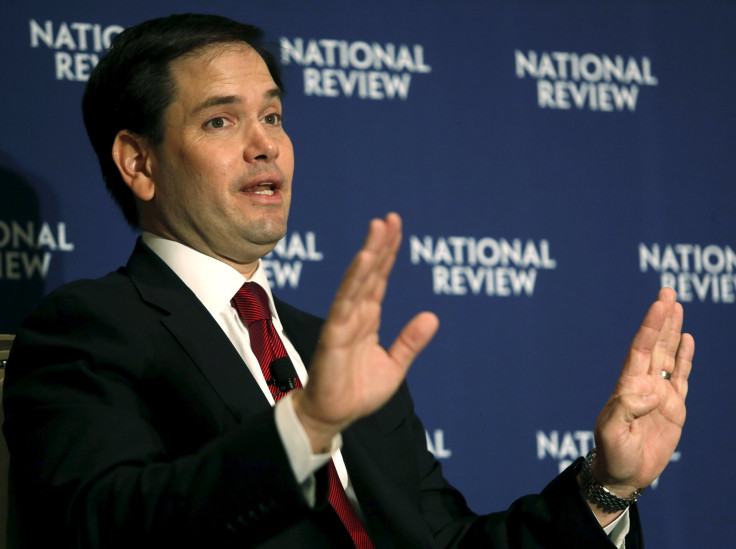Election 2016: Conservative Review Dings Rubio, Paul In First Presidential Report Card

WASHINGTON -- The Conservative Review hands out its first report card for 2016 Republicans Monday, and two candidates get schooled. According to the group, which was formed last year to score GOP lawmakers' adherence to conservative dogma, Sens. Marco Rubio of Florida and Rand Paul of Kentucky need improvement. Texas Sen. Ted Cruz earns top grades -- just as he used to at Princeton and Harvard Law.
International Business Times got an early look at the ratings of the three Republicans who have officially launched presidential campaigns. The Review graded them on criteria including immigration, foreign policy and "moral issues" like abortion, religious freedom and gay marriage opposition.
Founded by a group of Washington conservative operatives (including Freedom Works' Deneen Borelli, Daniel Horowitz, formerly of the Madison Project, and former congressional staffers Gaston Mooney and Rachel Semmel) the Review has already built credibility with its intended audience: The ratings are integrated with the conservative website Brietbart.com, appearing automatically next to any elected official's name.
The researchers at the Review were tough on Senator Rubio. “From the onset, Rubio was considered a Tea Party darling, a conservative lion, and a gifted orator,” the report says. “The gaping hole in Rubio’s conservative record is his active support for amnesty and comprehensive immigration reform with his fierce defense of the Gang of Eight amnesty bill.”

Not surprisingly, given that analysis, Rubio got a "bad" on immigration. “The major flaw in Senator Rubio’s otherwise conservative record is his liberal position on immigration,” says the report. “Rubio has staked claim to many different positions on immigration over the years, but his leading support for amnesty is unambiguous.”
Rubio also lost points for his comments on the size of government. “He opposes the requisite downsizing of government in order to balance the budget, supports keeping the costly Obamacare mandates on pre-existing conditions, and supported government intervention in hiring employees and incentivizing wage increases with government funding,” the report states.
The researchers dive into the candidates’ pasts, including reviewing their time in state governments. On Rubio, there were concerns about his time in the state Legislature. “In the Florida House of Representatives Rubio had a penchant for earmarks, thankfully this is not present at the federal level,” the group writes.
And they reviewed individual votes in Congress, dinging Rubio for his vote in April on an amendment to a trafficking bill the group argued would allow the government to discriminate against faith-based groups.
The Florida senator got good marks in areas like moral issues and the Second Amendment.
Senator Paul, a Libertarian, drew criticism for a perceived lack of opposition to the Affordable Care Act. (And in fact Paul did not, in his announcement speech, even mention "Obamacare" or vow to repeal the law -- a standard line in essentially any public appearance by a Republican politician.) The Conservative Review downgraded Paul for failing to support the effort (led by Cruz) to defund the law as it was being implemented in 2013. That effort ultimately led to the government shutdown of October 2013.

“Some conservatives were taken back when he didn’t lend his full support to the effort to defund Obamacare although ultimately Paul did vote against funding Obamacare," the report said. "Paul has also expressed a willingness to keep portions of Obamacare.”
Conservative Review also noted another vulnerability for Senator Paul: foreign policy. Paul has tried to distance himself from the isolationist views of his father, who ran twice for president on a strong anti-engagement platform. Rand Paul has eschewed foreign engagement in several instances, opposing some measures to combat the Islamic State group and arguing Iran isn't a threat to America, but also has taken positions on foreign aid and treaties that are more in line with conservative Republican hawks.
“These shifting positions and vague pronouncements from candidate Paul justifiably make conservatives uneasy,” Conservative Review wrote. “Conservatives are concerned that Paul is attempting to appeal to mainstream Republicans without alienating his father’s libertarian base. The end result is that conservatives have no idea how Paul would govern as president.”
Cruz, by contrast, got high marks. The only area where the Review offered slightly lower assessments was in the category of “free market” -- citing him for supporting some tobacco subsidies plus two government-orchestrated insurance programs that cover flood damage and terrorist attacks.
But overall, the Conservative Review gave Cruz a rave. “Cruz has made it clear that he didn’t come to Washington to make friends, and he’s kept good on his promise to fight even when it isn’t popular,” the group wrote.
That's the kind of report card comment Cruz wants: He's not looking for friends, he's looking to win hardcore conservative supporters.
© Copyright IBTimes 2024. All rights reserved.





















